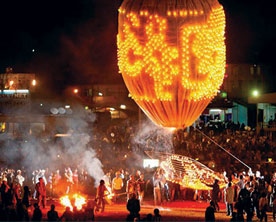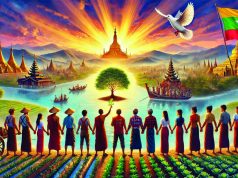The Thadingyut Festival, also known as the Lighting Festival of Myanmar, is held on the full moon day of the Thadingyut. Myanmar is rich in culture, and has developed its own distinctive culture. Buddhism has great influence on the daily lives of Myanmar people. Myanmar is said as “Land of Festivals” because there is at least one festival is held every month. Well-known traditional festivals are Thingyan (New Year Water Festival), Thadingyut, Tazaungdaing and Waso.
Thadingyut, the seventh month of the Myanmar calendar, is the end of the Buddhist lent. Thadingyut festival lasts for three days: the day before the full moon day, the full moon day (when Buddha descends from heaven) and the day after the full moon day. It is the celebration to welcome the descent of Buddha from heaven after he preached the Abidhama to his mother reborn in heaven. When Lord Buddha descended from heaven, people all over the country light candles to welcome back. As it is held every year since then, it became a traditional festival.
In small towns, there are small earthen saucers filled with sesame oil where pieces of cotton are used as wicks. In cities, houses, public buildings, parks, monuments and some roads in downtown are all illuminated and decorated with electric colorful lights. One of the famous Pwe Zay (street fair with many stalls and booths) in Yangon is held in Yay Kyaw in Pazzaungdaung Township annually. There are lots of food-stalls that sell a variety of Myanmar traditional foods, shops which sell toys, chicken utensils and other useful staff. Many people just walk around those streets for sightseeing, taking photos and enjoying traditional foods with their family and friends. There are also free stage shows on the streets around Yay Kyaw.
On Full Moon Day of Thadingyut, there are fundraising drives for charities, musical performances, street dancing, and all activities of entertainment in communities. Some people like to play with firecrackers and hot air balloons. Thadingyut Festival is held not only for pleasure but also paying homage to Buddhist monks, teachers, parents and elder people. Groups of young people and children usually pay respect and offer foods to elders. Buddhists go to the pagodas and monasteries to pay respect to the monks and offer foods. Some Buddhists usually keep fast on the full moon day. By paying homage, younger people ask for forgiveness from the wrong-doings they have committed upon their parents and the elderly relatives throughout the year.
Traditionally the elders tell them that they forgive any of their wrong-doings and continue to bless them with good luck and best wishes. Elder people give them some big notes as pocket money in return.
The busiest places for Lighting festival are Shwedagon Pagoda and downtown area in Yangon. Buddhists offer candles, flowers, incense sticks to the Lord Buddha and do other good deeds on the full moon day. Festival is held in Mandalay around Kyauk Taw Gyi Pagoda because it coincides with the Pagoda Festival.
Marriages are usually forbidden during the Buddhist lent, perhaps this custom is a bit conservative. Thadingyut is also a period on which many couples get married after the long Lenten period. Moreover, the public holidays come on the full moon of Thadingyut for three days. Some workers usually travel with their friends and families to take relax and stay for a while free from duties and responsibilities.
Thadingyut is not only stuffed with festivals but also an auspicious custom of remembering gratitude. And also it is the happiest time for all people, particularly workers and students for three public holidays and Buddhists for doing good deeds during the Thadingyut Festival. Another well-known festival is the Tazaungdaing Festival, which is also known as the Festival of Lights. The festival is held on the full moon day of Tazaungmon, the eighth month of the Myanmar calendar, is celebrated as a national holiday and marks the end of the rainy season.
Robe-weaving competitions to weave special yellow monk robes (Matho thingan) are also held throughout the country, particularly in Shwedagon Pagoda. During these competitions, contestants work continuously from night until dawn to weave these garments. The tradition commemorates a widely known story of the Buddha’s life. The Buddha’s mother (Maya) who had been reborn in the heaven, spent the entire night weaving yellow monk robes for him. Buddha’s aunt (Gotami) continued this tradition and offered new robes annually.
In many parts of Myanmar, hot air balloons lit with candles, are released to celebrate the full moon day. The balloons are released as an offering to the Sulamani zeti in heaven or as a way to drive away evil spirits. Among Tazaungdaing festivals, Taunggyi’s hot-air balloons and firework-launching competition is the most prominent festival. Hot air balloon festival is held annually in November, around the full moon day of Tazaungmone. Thousands of local people and international tourists choose to visit Taunggyi, the capital city of Shan State to watch scores of giant paper animals being inflated and floated off into the sky.
Competitions run during the day and at night when the sky is colorfully illuminated with hot air balloons. Day balloons are usually in the form of pagodas and animals such as elephants, dragon or ducks while the night balloons usually in the shape of rugby ball, huge elongated paper lanterns hung around their sides.
Alms-giving and charity, both religious and secular festivals including satuditha feasts, are also held during this festival to get merits in many parts of the community. Some Buddhists are still busy to pay respect to the elders with fruits and gifts and to visit pagodas. In small towns, young men celebrate a custom called “kyimano pwe”, by stealing or playing tricks on their neighbors on the eighth waning night of that month.
Tazaungdaing festival is second wellknown festival after the Thadingyut festival as there are many religious and secular festivals. Moreover, Taunggyi hot air balloons competition is wellknown not only among locals but also among tourists.










